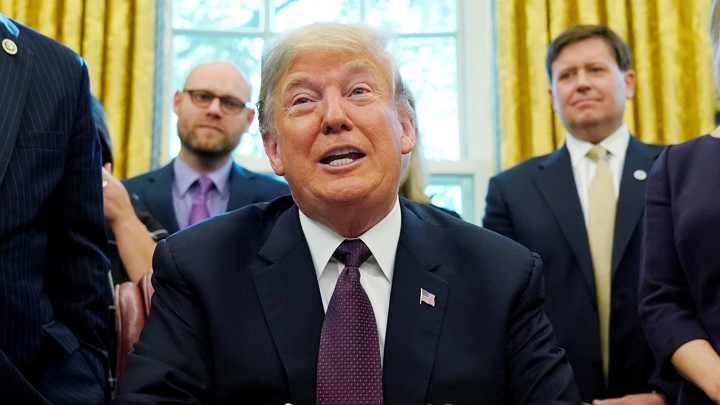Kori Schake
 The Halifax Security Forum is designed to be a gathering of the world’s democratic countries, which are allied to protect each other. Hosted by the Canadian defense minister, the Forum’s signature is the brief videos that introduce the annual gathering. This year’s intro showed relay runners, mostly American, at the Olympics from Berlin in 1936 forward, ending in an uncertain baton handoff—a powerful metaphor for the free world’s worries about American leadership in the age of Trump.*
The Halifax Security Forum is designed to be a gathering of the world’s democratic countries, which are allied to protect each other. Hosted by the Canadian defense minister, the Forum’s signature is the brief videos that introduce the annual gathering. This year’s intro showed relay runners, mostly American, at the Olympics from Berlin in 1936 forward, ending in an uncertain baton handoff—a powerful metaphor for the free world’s worries about American leadership in the age of Trump.*
The Halifax Forum, occurring just after President Donald Trump unleashed yet another petulant tirade against Germany and France that culminated in the unseemly taunt that Parisians were speaking German until the U.S. intervened in World Wars I and II, had a funereal feel this year. Allies are grieving the loss of an America they believed in, as it sinks in that they cannot rely on us any longer.
The U.S.’s senior military officer, General Joseph Dunford; the commandant of the Coast Guard, Admiral Karl Schultz; and the indopacom commander, Admiral Philip Davidson, all participated and gave strong, sensible remarks. There was no policy representation from the civilian leadership of the Department of Defense; no senior diplomats or White House officials managed to make time for the country that took in American flights after September 11, or those nations that invoked nato’s mutual-defense clause after we were attacked, or those countries struggling to become more democratic in our image. Experts on civil-military relations worried about the optics of only uniformed military personnel delivering American policy messages, but sorrowfully acknowledged that it was better to have the military provide forces of institutional stability than to leave allies completely adrift.
A substantial congressional delegation—eight senators and Representative Mike Gallagher—tried to reassure those gathered that America still valued the countries that share its political creed and shoulder common burdens. But none of those members of Congress present are major political forces in the American legislature. John McCain, who had long led the congressional delegation to Halifax, was tearfully eulogized—but he had no clear heir.
The Forum awarded the inaugural McCain Prize for Leadership in Public Service to the people of Greece’s island of Lesbos for upholding the West’s values by tending to illegal immigrants teeming to their shores. Kevin Baron from Defense One challenged Dunford about the hypocrisy of celebrating Greek assistance to migrants while deploying U.S. forces to prevent migrants from coming to the United States. Dunford acquitted himself well, modeling textbook military subordination to civilian control by refusing to allow himself to be drawn into debating the president’s policies. But you could feel the discouragement of American allies in the room.
The United States has never been as good as its billing and is—thankfully—almost always better than its government. United Nations Secretary General António Guterres previously announced that the first country to meet its Paris-climate-accord goals will likely be the United States of America—despite Trump withdrawing from the accords and the federal government acting in overt hostility to them. The golden state of California and mayors of 31 cities, as well as American businesses and consumers, are driving compliance irrespective of the federal government.
It’s not just that allies don’t believe the reassuring voices in the administration; they are tired of tuning in to the malicious circus of American politics and policies. They’re exhausted with our solipsism and drama, and disappointed with our indifference to anyone else’s problems and politics. They are resigning themselves to a world without American inspiration or partnership, to a post-American international order.
The Americans present at the conference pointed to policy successes, like the establishment of nato’s 30-30-30 rapid-deployment forces, U.S. troops deploying to Poland, reconstituting the Second Fleet to patrol the Atlantic, and integral U.S. participation in nato’s biggest military exercise since the end of the Cold War. But allies are getting tired of hearing it. Not only were those successes overshadowed by Trump’s offensive behavior, the incandescence of his public rage called into question whether the United States would come to the defense of its allies in a crisis.
The decibel level of mean-spiritedness coming from the highest levels of American government is deafening our friends to our better selves. Allies believe they are witnessing something they never expected to behold, and which endangers both their security and our own: the United States putting an end to the American order. Word came through during the Forum that natowill not be holding a 70th-anniversary celebration, because the president of the United States cannot be trusted not to bring the temple down upon all our heads. That was the dirge played in Halifax.
* This article originally stated that the Olympics were held in Berlin in 1932.
We want to hear what you think about this article. Submit a letter to the editor or write to letters@theatlantic.com.
No comments:
Post a Comment